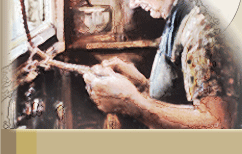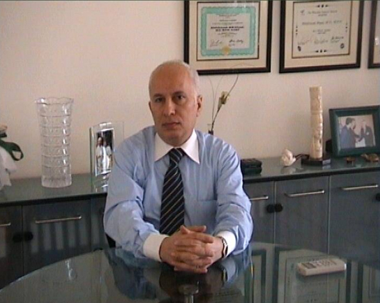|


    
| |
Chief editor
Abdulrazak Abyad MD, MPH, MBA, AGSF, AFCHSE
Editorial office:
Abyad Medical Centre & Middle East Longevity Institute
Azmi Street, Abdo Centre
PO Box 618
Tripoli, Lebanon
Tel: 961 6 443 684
Fax: 961 6 443 685
aabyad@cyberia.net.lb
Publisher
Lesley Pocock
medi+WORLD International
11 Colston Avenue
Sherbrooke, 3789, VIC
Australia
Tel: +61 3 9005 9847
Fax: +61 3 9012 5857
Lesleypocock@mediworld.com.au
|
|
|
While all efforts have been
made to ensure the accuracy of the information in this journal,
opinions expressed are those of the authors and do not necessarily
reflect the views of The Publishers, Editor or the Editorial
Board. The publishers, Editor and Editorial Board cannot be
held responsible for errors or any consequences arising from
the use of information contained in this journal; or the views
and opinions expressed. Publication of any advertisements
does not constitute any endorsement by the Publishers and
Editors of the product advertised.
The contents of this journal
are copyright. Apart from any fair dealing for purposes of
private study, research, criticism or review, as permitted
under the Australian Copyright Act, no part of this program
may be reproduced without the permission of the publisher.
|
|
|

|
| November
2017 , Volume 14 - Issue 3 |
|
Editorial

Editor: A. Abyad
|
|
This is the
last issue this year of the journal that handle important
issues in Geriatrics. A paper from turkey attempted
to evaluate the level of sarcopenia of home-dwelling
elderly and the attitudes to frailty by asking their
relatives, who applied as patients to a family practice
in Antalya, Turkey. The study was a cross-sectional
study with 1016 patients were asked if they had a frail
elderly person at home. Participants, who gave positive
answer were further asked questions on frailty level
(SARC-F) of their elderly and attitudes concerning frailty
at home. Descriptive statistics, Chi-square, and Spearman's
rho correlation were used. Sarc-F Total Score was found
5.2 (median=5; SD=1.1; min-max=3-8; n=125). Participants
were in agreement with statement "I feel competent
in caring for my frail elder", "I would follow
the treatment recommendations of my frail patient",
"I would seek appropriate supprt for my frail elder",
"Immobile, frail elder need home health services",
"The family plays an important role in the early
diagnosis of frailty", "Mobile technologies
play an important role in the care of frail elders",
and "Family members play an important role in the
care of frail elders". The determination of self-perceived
health is an acceptable method for assessment of the
person, which might be also useful in caregivers of
frail elders. This could certainly help to evaluate
unmet health needs of frail elders, who are not able
to visit the family physician.
A paper from Kurdistan looked at depression of older
people in Kurdistan
Depression in the older people:
A perspective from Kurdistan . Elderly population are
increasing world-wide. In the next few decades such
increase will be more prominent in developing world
including Middle Eastern countries. Rate of morbidity
is very much age related including depression. Impact
of depression on health service is enormous world-wide.
The aim of the study to determine the prevalence of
depression among elderly people in Kurdistan and identify
any relation between depression in that population and
gender, age, education level, Economical status, marital
status, housing, alcohol use, functional status and
history of chronic medical illnesses. The Geriatric
Depression Scale -15(GDS-15) was translated to Kurdish
and used for assessment of elderly patients, those above
the age of 65. The researchers collected data via direct
face to face interviews with the patient. 650 elderly
subjects were questioned between January and June 2014.
64.2% of the study population scored at least 5 as per
geriatric depression scale which is very significant.
22.8% had a score indicating they suffered moderate
to severe depression. These finding had not been found
in other similar studies in other countries. It was
found to be statistically significantly that incidence
of depression was higher in those who were older, female,
had a higher level of education, from low socioeconomic
status, unmarried and with chronic illness. A finding
which found in other studies
A review paper from Lebanon
and Tunis looked at the fear of falling syndrome as
an emerging problem. The authors stressed that over
the last two decades a surge of interest in the phenomenon
of fear of falling. This paper summarizes current data
pertaining to the concept, epidemiology, assessment
and management of fear of falling. In addition it elaborate
on the relationship of fear of falling to other factors.
Fear of falling is a conceivable cause of excess disability
and evolving public health problem. Fear of falling
has been reported in a high percentage of community-dwelling
elderly who both do and don't have a history of falling.
The aims of this review are to: (a) elucidate the definition
of fear of falling; (b) clarify measurements of fear
of falling based on its definition; and (c) describe
the risk factors for fear of falling.
- - - - - - - - - - - - - - -
- - - - - - - - - - - - - - - - - - - - - - - - - -
-
|
|
|
|

